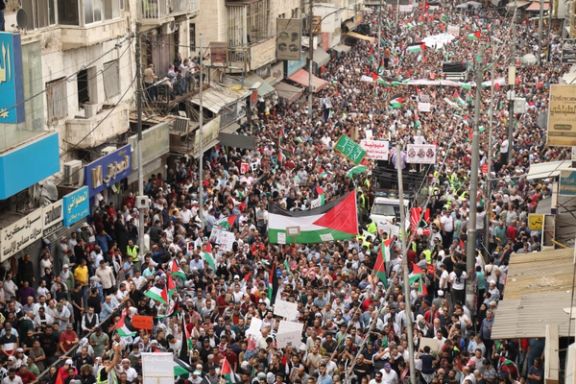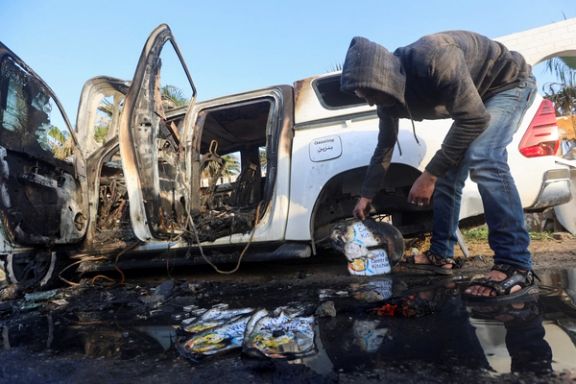Iran Launches Offensive To Dominate Jordan: Experts

The Islamic Republic of Iran is stoking violent discontent against the Hashemite Kingdom, with a view toward gaining control over Jordan as part of an expanded “Shiite Crescent.”

The Islamic Republic of Iran is stoking violent discontent against the Hashemite Kingdom, with a view toward gaining control over Jordan as part of an expanded “Shiite Crescent.”
A new April analysis by the US-based Middle East Media Research Institute (MEMRI) of the pro-Hamas demonstrations on the streets of Amman sounded the alarm bells about the role of Iran’s revolutionary Islamic ambitions in Jordan.
According to the report authored by Ayelet Savyon, the Director of the MEMRI Iran studies project, “In recent days, the grand Iranian plan is emerging – the plan with which the Islamic revolutionary regime is continuing despite the killing, in Israeli air strikes, the senior command of its IRGC Qods Force in Syria and Lebanon. The upcoming stage of this plan involves bringing down the regime in Jordan, attacking Israel from the east while Israel is kept busy by Iran-backed resistance forces in Lebanon, Syria, and Gaza. The political aim of this plan is to thwart the Saudi-American project of normalization with Israel.”
She added that “Next in Iran’s sights is the expulsion of American forces from Iraq, and the undermining of the Saudi Kingdom and the Egyptian regime, as Iran actualizes the vision of Islamic Revolution.”
She warned that “It is not clear whether the US administration, which is currently preoccupied with the IDF’s tragic mistaken killing of the World Central Kitchen charity workers, is aware of events that could impact the continued US presence in the region as well as America’s international standing.”

On Saturday, Iran International reported that the Tehran-backed Iraqi Hezbollah battalions are prepared to arm and equip 12,000 fighters of “the Islamic resistance” in Jordan. The Iranian regime-controlled news agency ISNA stated Iranian-backed proxies will supply the 12,000 combatants in Jordan.
Dr. Walid Phares, an expert in foreign policy and the author of Iran, an Imperialist Republic, and US Policy, told Iran International “What is happening in Jordan now, while it appears as chaotic, is in fact tightly organized by Hamas, the larger Muslim Brotherhood network and the Iran regime. The protests against the Israeli embassy and spill over in Amman's streets are the result of tightly coordinated moves by the Iran and Ikhwan [the Arabic term for Muslim Brotherhood] networks, with the real target being the Hashemite Kingdom itself. “
The Gaza-based Hamas movement, the Palestinian branch of the Muslim Brotherhood, is a potent ally of Iran’s regime. The former Muslim Brotherhood president of Egypt, Mohammed Morsi, worked to rekindle relations with the Islamic government of Iran.
Phares, who served as a national security advisor to US Presidential nominees, added, “Tehran always considered the kingdom as an advanced US ally in the region threatening the Iranian militias in Syria and Iraq, and a forward base for US and allied troops in the region. In fact, American and British troops have bases in Jordan that support Coalition activities in the whole region. Remember that the pro Iran militias have targeted a US base on the Jordanian border with Syria.”
The Mideast expert said, “Hence we know that Tehran and Damascus have been targeting the Hashemite kingdom for years and now it looks like they've unleashed their supporters against the regime.”
“The problem seems to be in Washington because of foreign policy decisions since the catastrophic withdrawal from Afghanistan. It was a cascade of encouragement to jihadists and pro-Iranian forces. Jordan is getting close to a possible large domestic clash caused by Hamas, Iran, and a result of an administration that put a transaction with the Iran regime above the national security interest of America and the stability of its direct allies in the region,” Phares said.
Former Israeli Ambassador Jordan, Jacob Rosen, who lived in Jordan for nine years, told Iran International that Iran has been many years “trying to push their way” into Jordan. He said “in south Jordan in Karak there is a holy grave for the Shiites.” He added “They [the Iranians] are always pushing Jordan to open the borders to bring tourism. The Jordanians resist the idea because they know what it means.”
The town of Mu'tah in the Karak Governorate was the location of a famous battle in 629 CE between Arab Muslims and Christians. A cousin of the Prophet Muhammad, Jaʿfar ibn Abī Ṭālib, was killed during the battle.
Rosen pushed back against the oft- cited Western journalistic narrative that Jordan is a fragile country. He said many other Arab governments “are soldiering on. What is fragile? There are no beggars in the streets and no hunger. The tribal networks are very strong. “
He added “The Jordanian government and the people are very strong and aware of the challenges. And if they need extra help from other countries, they get it.”
In a January 2024 article titled “Jordan and the Iranian Affiliates Drug Offensive,“ Rosen wrote with his co-author, Shaul Shay, a former deputy head of Israel’s National Security Council, that “In last year Tehran begun to target the Hashemite kingdom of Jordan, one of the main Western allies in the region. Iran and its affiliated terrorist groups are leveraging the war in Gaza to undermine the stability and sovereignty of Jordan and the peace agreement between Jordan and Israel.”
According to the article, “Iran’s presence in Syria and Iraq provides it the ability to penetrate from two directions with proxy forces and Syrian…make it easy to exploit internal divisions. The smuggling of drugs and weapons from Syria to Jordan is seen as an attempt by Iran to expand its influence in the region and destabilize Jordan.”
The Israeli experts stressed that “Given the strategic importance of Jordan in the Middle East, it is imperative to closely monitor Iran’s actions and alliances and supporting Jordan’s stability through diplomatic, economic and military means.”